Jump to:
What is hair toner and when should you use it? How do you use it? Is at-home or salon-grade toner best? What are the benefits? We’ll answer each of these questions (and more) in our complete guide.
Considering Hair Toner?
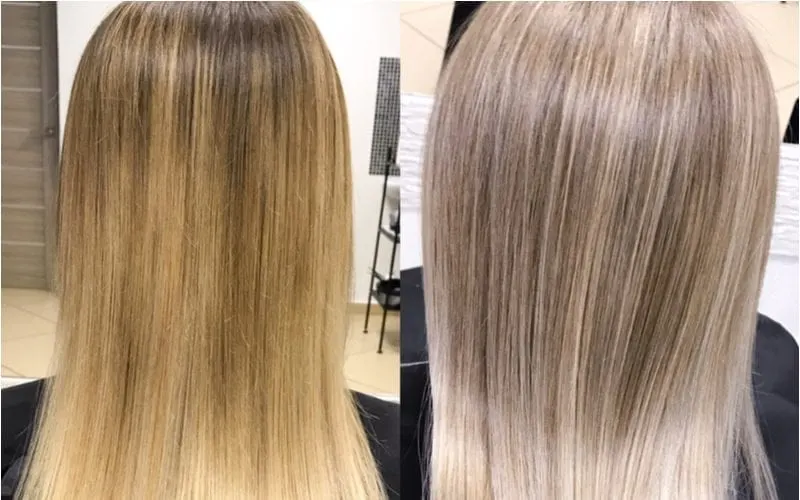
Shumskaya Tatiana/Shutterstock
Switching up your hair color is an excellent way of sprucing up your look and reinventing yourself. If this is something you’ve recently dabbled in, you might still be basking in that tremendous new-hair feeling.
If you love your new hair color, toner might be the solution you’re looking for to lock-in that gorgeous shade in place. But toner is usually not the same thing as hair dye. However, some colorists will use standard hair color with a lower strength developer (demi-permanent color) in place of a toner.
Anyone who’s bleached their hair before going a few shades lighter might already know that coloring your locks isn’t always enough to produce the perfect tone.
This is often the case if you’re trying to go from a darker color to blonde – in these instances, it’s not uncommon to find unwelcome yellow or brassy oranges in your hair.
This is where hair toner comes in.
Hair toner can help you adjust and perfect your hair color. So, in this article, we’re covering everything you need to know about hair toners. What they are, how to use them, and what to consider before picking one.
There’s lots to cover, so let’s dive straight in!
What Is Hair Toner?
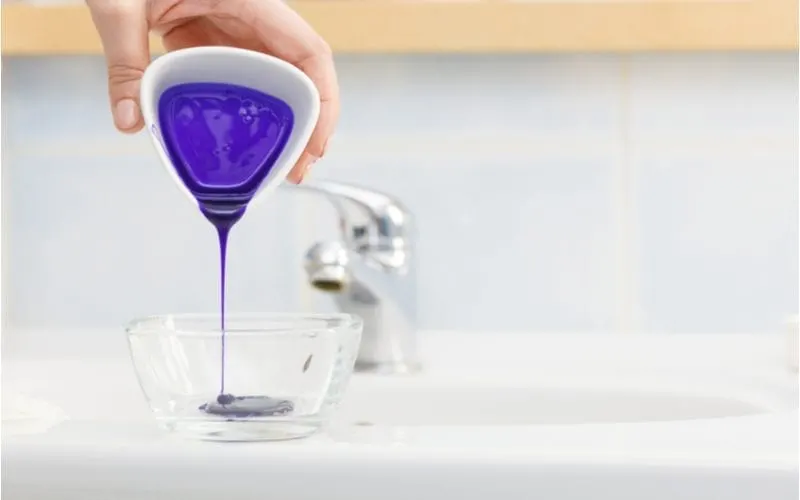
Anetlanda/Shutterstock
Hair toner does exactly what it sounds like. It tones your hair! A hair toner is anything that contains a pigment that adjusts the tone of your hair. Typically, the tint in toners lasts between three to four weeks.
Typically, hair toner is used on freshly bleached or colored hair. As applying toner can emphasize or de-emphasize certain tones, you or your stylist can use it to round off the final color to shift it in the desired direction.
It’s also available as a gel or gloss-like formula to add shine to your color.
At this point, it’s worth noting hair toners aren’t one specific product. Depending on the look you’re going for, there are different toners available.
For example:
- Demi-permanent colors
- Glosses
- Tinted shampoos
- Tinted Conditioners
Why Should You Use Hair Toner?
Hair toners come in useful for several purposes. But as we’ve already hinted at, the most common reason is to slightly adjust the color of freshly dyed hair.
Most notably, taking bright yellow or golden hair and giving it a more natural tone. This works wonders if you’re looking to achieve a more natural dusty, ashy, or platinum blonde look.
That said, here are a few other scenarios where you might want to use a hair toner:
- You found a color you love and wish to maintain the tones in your hair
- You want to adjust the shade of your hair so that it’s cooler or warmer
- You want to add shine to your hair or increase its softness
- You want to reduce the appearance of split ends
- You wish to bring life into brassy or dull hair
- You want to make existing colors more vibrant
You can even just apply hair toner to targeted areas, such as highlights – the choice is yours!
How Do You Use Toner?
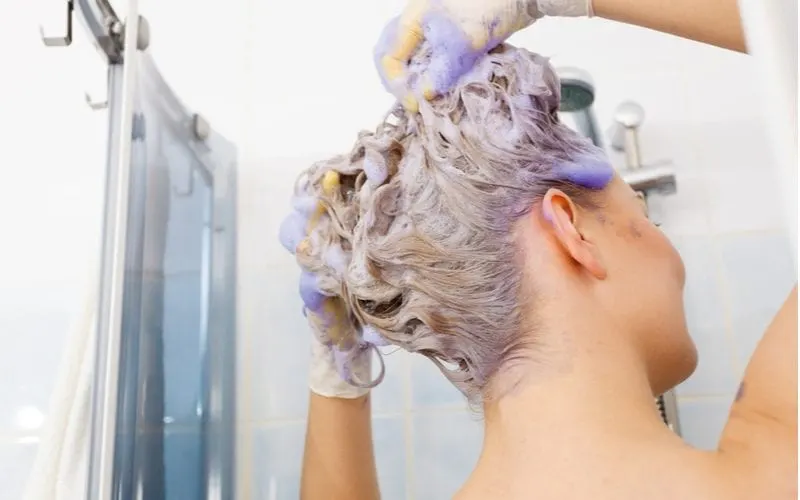
Anetlanda/Shutterstock
The important thing is to choose the right product for your hair. Once you’ve picked a toner, you can quickly tone bleached hair to create a more natural look.
Here’s how:
- Mix your toner with a developer in a ratio of 1:2
- Work the mixture into your hair with an applicator brush. Focus on the areas you want to adjust.
- Leave the toner on for 45 Minutes.
- Rinse and wash with a moisturizing shampoo and a deep conditioner.
Bleached hair will develop brassy undertones as it oxidizes, and your color treatment will fade over time. As such, it’s best to refresh your color with a toner roughly every 5-8 weeks to keep that bright, natural blonde look!
Can You Use Hair Toner at Home?
If you’re using a toning shampoo or conditioner, this is easily done at home. For more sophisticated colorwork, we recommend consulting a professional. It’s easy to mess up your color by accidentally going outside of your color family. Color theory is a very complex science, so you can get yourself in trouble quick if you don’t understand the color wheel and how it comes into play with hair color.
A professional will help you choose and apply the right product.
If you insist on using a hair toner at home, do a patch test first on a small chunk of hair near the nape of your neck. You can then add a bit of shampoo to your toner to emulsify it through your hair.
Be sure to follow the instructions on the pack. Then, once you know you like the result, applying the toner all over is much less of a risk.
The Benefits of Using Salon Hair Toner
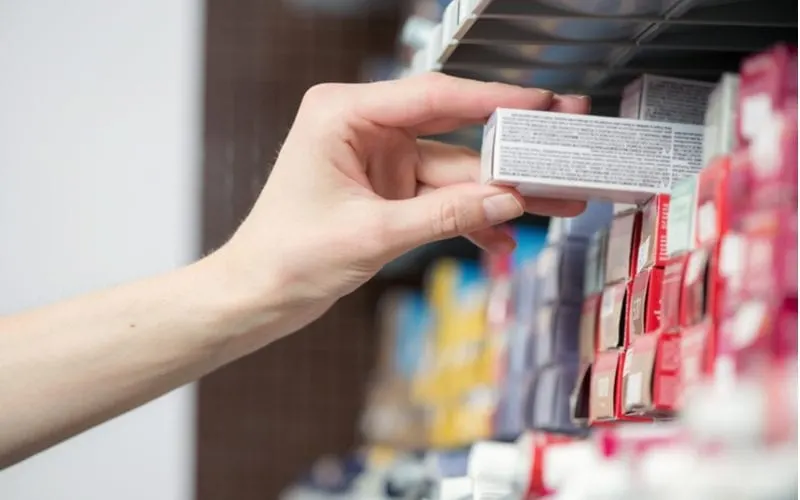
Ravil Sayfullin/Shutterstock
While you can tone your hair at home, professional hairdressers can assist with better-tailored hair toners. They can correct unwanted shades and mix warming and cooling tones to bring the vision you have for your hair to life from root to tip.
Not to mention, salon toner is often more pigmented than at-home hair care products, meaning they’re likely to last longer.
How to Choose the Right Toner
As we’ve already said, finding the right hair toner is essential. We’ve already listed some of the different types of toners available. Now let’s take a look at them in more detail:
Demi-Permanent Colors
Demi-permanent colors, also known as glosses, deposit color onto your hair without lightening it. They last six to eight weeks and fade out of your hair without a grow-out process.
Glosses might work for you if you switch hair colors often. They’re also great if you want to try something new without committing to a permanent dye.
Purple and Blue Toning Products
These toners commonly come in shampoo and/or conditioners and include blue or purple pigmentation. They help to eliminate yellow and/or brassy hues from newly bleached hair.
The violet in the toner reduces the unwanted coloration and keeps your blond hair looking fresh. Blue toners, on the other hand, cancel out orange shades in brunettes and improve luster.
These toning products produce a gradual change that occurs over several uses. Be sure to use the product for several shampoos before deciding if it’s giving you the desired result. Also, watch out for any staining that can occur on overprocessed ends. If you start to notice a blue or purple tinge to your hair, stop using color enhancing products in these areas and do a precise application in the areas that still need some help.
So Which Toner Is Right for You?
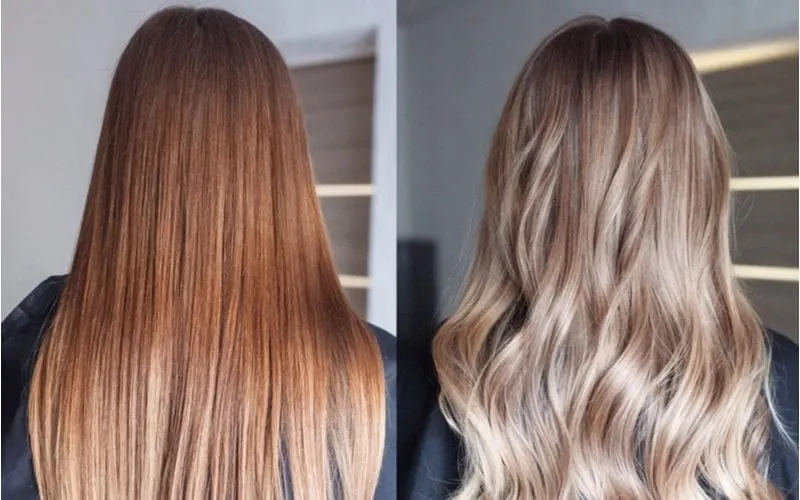
Shumskaya Tatiana/Shutterstock
In short, if you want to cancel out oranges to achieve a darker blond or light brown, a blue toner is best. Alternatively, if you’re aiming for a more silvery blonde, a violet-based toner can remove some of the unwanted saturation.
Remember: ammonia-based toners actually deposit colored dyes to your hair shafts, so choose carefully to get the best results.
All in all, hair toner is a great, non-permanent way of improving your hair color. It’s a super-easy way of freshening up your hair while unlocking several benefits, like enhanced shine and more vibrant colors.
Hair toner isn’t just for blondes either. You can use this product to adjust the warmth of your brunette or red hair and remove any unwanted undertones. Toners and color enhancing products can also prolong the life of your vibrant red color and prevent fading, which are two of the most frustrating issues associated with permanent red hair dye.
Although hair toner can easily be used at home, if you want the best for your hair, consult a professional who can point you in the direction of the best product and application.
